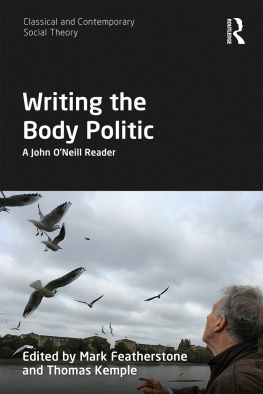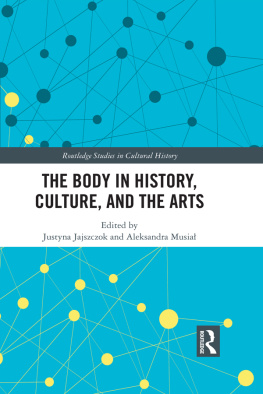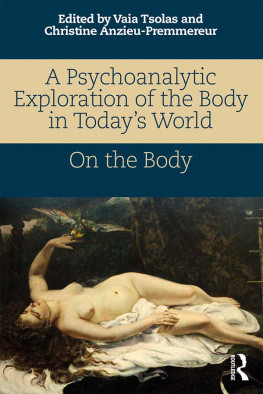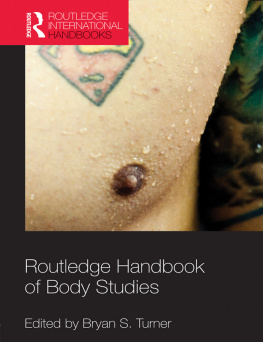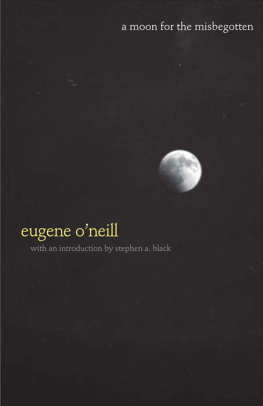Writing the Body Politic
This book brings together key essays from the career of social theorist John ONeill, including his uncollected later writings, focusing on embodiment to explore the different ways in which the body trope informs visions of familial, economic, personal, and communal life.
Beginning with an exploration of ONeills work on the construction of the biobody and the ways in which corporeality is sutured into social systems through regimes of power and familial socialisation, the book then moves to concentrate on ONeills career-long studies of the productive body and the ways in which the working body is caught in and resists disciplinary systems that seek to rationalise natural functions and control social relations. The third section considers ONeills concern with the ancient, early modern, and psychoanalytic sources of the post-modern libidinal body, and a final section on the civic body focuses specifically on the ways in which principles of reciprocity and generosity exceed the capitalist, individualist body of (neo)liberal political theory. The volume also includes an interview with ONeill addressing many of the key themes of his work, a biographical note with an autobiographical postscript, a select bibliography of ONeills many publications, and an extensive introduction by the editors.
A challenging and innovative collection, Writing the Body Politic: A John ONeill Reader will appeal to critical social theorists and sociologists with interests in the work of one of sociologys great critical readers of classical and contemporary texts.
Mark Featherstone is Senior Lecturer at Keele University, UK, and author of Tocquevilles Virus: Utopia and Dystopia in Western Social and Political Thought (2006) and Planet Utopia: Utopia, Dystopia, Globalisation (2017).
Thomas Kemple is Professor of Sociology at the University of British Columbia, Canada, and author of Reading Marx Writing: Marx, Melodrama, and the Grundrisse (1995), Intellectual Work and the Spirit of Capitalism: Webers Calling (2014), and Simmel (2018).
Classical and Contemporary Social Theory
Series Editor
Stjepan G. Mestrovic, Texas A&M University, USA
Classical and Contemporary Social Theory publishes rigorous scholarly work that re-discovers the relevance of social theory for contemporary times, demonstrating the enduring importance of theory for modern social issues. The series covers social theory in a broad sense, inviting contributions on both classical and modern theory, thus encompassing sociology, without being confined to a single discipline. As such, work from across the social sciences is welcome, provided that volumes address the social context of particular issues, subjects, or figures and offer new understandings of social reality and the contribution of a theorist or school to our understanding of it.
The series considers significant new appraisals of established thinkers or schools, comparative works or contributions that discuss a particular social issue or phenomenon in relation to the work of specific theorists or theoretical approaches. Contributions are welcome that assess broad strands of thought within certain schools or across the work of a number of thinkers, but always with an eye toward contributing to contemporary understandings of social issues and contexts.
Titles in this series
The Unmasking Style in Social Theory
Peter Baehr
Writing the Body Politic
A John ONeill Reader
Edited by Mark Featherstone and Thomas Kemple
Emotions through Literature
Fictional Narratives and the Management of the Self
Mariano Longo
For more information about this series, please visit:
www.routledge.com/sociology/series/ASHSER1383
Writing the Body Politic
A John ONeill Reader
Edited by Mark Featherstone and Thomas Kemple

First published 2020
by Routledge
2 Park Square, Milton Park, Abingdon, Oxon OX14 4RN
and by Routledge
52 Vanderbilt Avenue, New York, NY 10017
Routledge is an imprint of the Taylor & Francis Group, an informa business
2020 selection and editorial matter, Mark Featherstone and Thomas Kemple; individual chapters, the contributors
The right of Mark Featherstone and Thomas Kemple to be identified as the authors of the editorial material, and of the authors for their individual chapters, has been asserted in accordance with sections 77 and 78 of the Copyright, Designs and Patents Act 1988.
All rights reserved. No part of this book may be reprinted or reproduced or utilised in any form or by any electronic, mechanical, or other means, now known or hereafter invented, including photocopying and recording, or in any information storage or retrieval system, without permission in writing from the publishers.
Trademark notice : Product or corporate names may be trademarks or registered trademarks, and are used only for identification and explanation without intent to infringe.
British Library Cataloguing-in-Publication Data
A catalogue record for this book is available from the British Library
Library of Congress Cataloging-in-Publication Data
A catalog record has been requested for this book
ISBN: 978-1-138-63317-9 (hbk)
ISBN: 978-1-315-20782-7 (ebk)
Typeset in Times New Roman
by Deanta Global Publishing Services, Chennai, India
For our students
In memory of Gregory ONeill (19672018)
Contents
PART 1
The biobody
PART 2
The productive body
PART 3
The libidinal body
PART 4
The civic body
The body politic (chiasm) |
The body politic (matrix) |
The body politic (genealogy) |
Example as similitude(s) |
Example as grammatology |
Example as narrative and deconstruction |
Psychic, social, and cultural systems |
Tree of Knowledge |
Dialectic of desire and recognition |
Ecce homo (or Christ before the people ) by Albrecht Drer (c. 14971500) |
Cover for Vanishing Youth? conference proceedings |
Civic capital exchanges in child development and economic growth |
Christian syndrome as gift complex |
Square of Saint Peter, Berninis Piazza Obliqua |
Body politics, civic schooling, and alien-nation: an interview with John ONeill |
Biographical notes on John ONeill, with an autobiographical postscript |
Selected works by John ONeill |
The original idea for an ONeill reader emerged in 2003 in a discussion between one of the now editors, Mark Featherstone, and John himself. Mark proposed the book in order to try to collect together Johns key texts which had been so influential in building his own career and understanding of sociology, social theory, and philosophy. This influence stretched back to late 1995 when Mark attended Johns lectures on post-modernism and French theory at Staffordshire University and then became his PhD student in 1996, attending courses at York University in the late 1990s. The idea was revived when Mark met up with Tom Kemple at the European Sociology Association Meetings in Prague in the summer of 2015. Tom first met John in 1983 and completed his PhD under Johns mentorship in the early 1990s. This book is thus a counter-gift of love and appreciation for our teachers inspiration, influence, and generosity.

